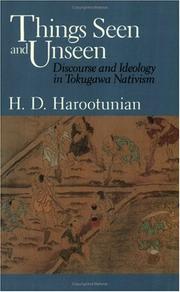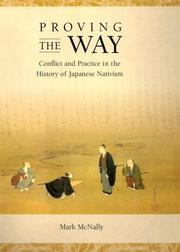| Listing 1 - 5 of 5 |
Sort by
|

ISBN: 0822331837 0822331721 0822384906 1283064553 9786613064554 Year: 2003 Publisher: Durham Duke university press
Abstract | Keywords | Export | Availability | Bookmark
 Loading...
Loading...Choose an application
- Reference Manager
- EndNote
- RefWorks (Direct export to RefWorks)

ISBN: 0226317072 0226317064 9780226317076 Year: 1988 Publisher: Chicago (Ill.) University of Chicago Press
Abstract | Keywords | Export | Availability | Bookmark
 Loading...
Loading...Choose an application
- Reference Manager
- EndNote
- RefWorks (Direct export to RefWorks)
Book
ISBN: 9004236333 9004235302 Year: 2012 Publisher: Leiden ; Boston : Global Oriental,
Abstract | Keywords | Export | Availability | Bookmark
 Loading...
Loading...Choose an application
- Reference Manager
- EndNote
- RefWorks (Direct export to RefWorks)
Kokugaku in Meiji-period Japan offers a new perspective on scholarly networks and the foundations of modern Japan. Utilizing never explored original sources and with a unique focus on the persons involved, Michael Wachutka elucidates how kokugaku as a cornucopia of traditional knowledge played an important role in raising a new generation of truly national citizens. Commonly perceived as a purely premodern Edo-period phenomenon, 'national learning' counterbalanced an overly Westernization of society in the process of nation building and identity formation. In addition to kokugaku activities in religious administration and higher education, Wachutka provides a compelling account of the organization and endeavour of three successive academic societies whose most prominent members served as junction of kokugaku’s intellectual network in Meiji Japan.
Kokugaku --- Shinto and state --- Religion and state --- Nationalism --- Universities and colleges --- Learned institutions and societies --- Academies (Learned societies) --- Learned societies --- Scholarly societies --- Associations, institutions, etc. --- State and Shinto --- State, The --- National Learning Movement --- Wagaku --- Philosophy, Japanese --- History. --- Japan --- Intellectual life.

ISBN: 0674017781 1684174090 Year: 2005 Volume: 245
Abstract | Keywords | Export | Availability | Bookmark
 Loading...
Loading...Choose an application
- Reference Manager
- EndNote
- RefWorks (Direct export to RefWorks)
Kokugaku --- National Learning Movement --- Wagaku --- J1450 --- J1008.60 --- Philosophy, Japanese --- Japan: Philosophy -- kokugaku, Japanism, Yamatoism --- Japan: Philosophy -- history -- Kinsei, Edo, Tokugawa period, early modern (1600-1867) --- Hirata, Atsutane (1776-1843) --- Japan --- Intellectual life --- -J1450 --- -Kokugaku --- Hirata, Atsutane, --- Hirata, Ibukinoya, --- Hirata, Daigaku, --- Taira, Atsutane, --- Ibukinoya, --- Taigaku, --- Taikaku, --- Hirata, Taigaku, --- 平田篤胤, --- 1600-1868 --- Hirata, Atsutane
Book
ISBN: 9789004235304 9789004236332 Year: 2012 Publisher: Leiden BRILL
Abstract | Keywords | Export | Availability | Bookmark
 Loading...
Loading...Choose an application
- Reference Manager
- EndNote
- RefWorks (Direct export to RefWorks)
Kokugaku in Meiji-period Japan offers a new perspective on scholarly networks and the foundations of modern Japan. Utilizing never explored original sources and with a unique focus on the persons involved, Michael Wachutka elucidates how kokugaku as a cornucopia of traditional knowledge played an important role in raising a new generation of truly national citizens. Commonly perceived as a purely premodern Edo-period phenomenon, 'national learning' counterbalanced an overly Westernization of society in the process of nation building and identity formation. In addition to kokugaku activities in religious administration and higher education, Wachutka provides a compelling account of the organization and endeavour of three successive academic societies whose most prominent members served as junction of kokugaku's intellectual network in Meiji Japan. -- Publisher.
Kokugaku --- Shinto and state --- Religion and state --- Nationalism --- Universities and colleges --- Learned institutions and societies --- History. --- Japan --- Intellectual life. --- Academies (Learned societies) --- Scholarly societies --- Associations, institutions, etc. --- Societies --- Learning and scholarship --- State and Shinto --- State, The --- National Learning Movement --- Wagaku --- Philosophy, Japanese --- J1450 --- J1008.70 --- J1910.70 --- J1942 --- Japan: Philosophy -- kokugaku, Japanism, Yamatoism --- Japan: Philosophy -- history -- Kindai (1850s-1945), Bakumatsu, Meiji and Taishō --- Japan: Religion -- Shintō -- history -- Kindai (1850s- ), bakumatsu, Meiji, Taishō --- Japan: Religion -- Shintō -- relation with politics and state, Shintō as national polity (kokutai) --- J1913.60 --- Japan: Religion -- Shintō -- sects and schools -- traditional -- fukko, kodō, kokugaku shintō --- Learned societies --- History
| Listing 1 - 5 of 5 |
Sort by
|

 Search
Search Feedback
Feedback About UniCat
About UniCat  Help
Help News
News